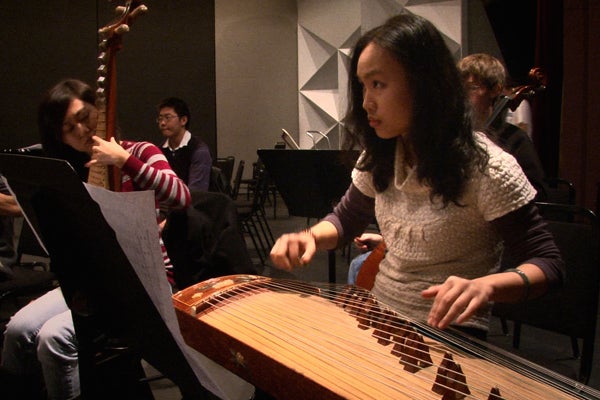|
View video here.
February 2, 2012
New generation explores cultural changes through Asian music at Stanford festival
Students pay homage to cultural history in the eighth annual Pan-Asian Music Festival. By Kelsey Geiser

The newly formed Stanford Chinese Music Ensemble rehearses for the Pan-Asian Music Festival in Dinkelspiel Auditorium. (Photo: Steve Fyffe / Stanford News Service) Ten Stanford students arrange their chairs and instrument cases in a semi-circle around their conductor and take out their exotic array of instruments. The Stanford Chinese Music Ensemble, created just three months ago, provides an outlet for Stanford students to develop the uncommon practice of playing an ancient Chinese instrument.
The ensemble, which made its debut performance at the 2012 Stanford Chinese New Year Gala, will perform again on Sunday, Feb. 5, at the eighth annual Stanford Pan-Asian Music Festival. The festival runs through Feb. 11.
Since the festival's inauguration in 2004, it has become prominent among Asian music festivals in the United States. Among the renowned musicians performing this year are Yonekawa Tosiko, Yuan Sha and Jin Hi Kim, a virtuoso of the komungo, a Korean string instrument.
Through a combination of instrumental and vocal performances, lectures, demonstrations and panel discussions, the festival devotes itself to the understanding and appreciation of contemporary Asian music.
Focus on China, Japan and Korea
This year's festival, Transforming Tradition, will focus on music from China, Japan and Korea. Specifically, it will examine how the musical traditions in these countries have transformed over time, both within and beyond their own cultures.
The eight-day program features celebrated international and local guests artists, faculty members of the Stanford Music Department and Stanford student musicians.
The Stanford Chinese Music Ensemble will perform at 8 p.m. Sunday in Dinkelspiel Auditorium during "Generation NeXT in Asian Music: Bay Area Ethnic Asian Ensemble Showcase." The gathering of youth ensembles from the Bay Area will demonstrate how young American musicians of various Asian backgrounds are inspired by their ancestral cultures. Tickets are $10 for the general public and $5 for students.
Music Associate Professor Jindong Cai, the founder and artistic director of the festival, hopes that the program will open the audience's eyes to the cultural connections between these countries.
"Sometimes when we [look at a country] from a political point of view, we always see conflict between different countries," Cai said. "But when we look into art, actually in those countries, so many things are related."
Students with an ancient talent
What sets this music festival apart is the opportunity it allows for students to collaborate and perform with professional musicians.
Stanford performance groups – including the Stanford Symphony Orchestra, Stanford Chinese Music Ensemble, Stanford Opera Workshop, Stanford Chamber Orchestra and Stanford Taiko – will be joined by similar groups from the Bay Area as well as by international and local professional musicians.
The Stanford Chinese Music Ensemble stands out for its devotion to ancient Chinese culture. As ensemble member Nathan Cheung said, "There is a community of Chinese musicians who come here [to Stanford] but they do not get an opportunity to showcase their skill or to play their instrument anymore."
Many of the students had acquired these skills previously through local ensembles or parental influence. However, losing that connection while at Stanford left some students feeling a sense of loss.
Despite Cheung's musical talent as an award-winning pianist, he felt that playing the liuqin, a Chinese lute, fully honored his connection to both Chinese and American cultures.
"I didn't keep playing because of my parents, I kept playing because there is a very different divide between the Chinese music culture and the Western music culture," said Cheung, who is majoring in music.
The ensemble's student leader, chemical engineering major Aaron Garg, plays the dizi, a Chinese flute, to maintain a grounding connection to tradition. "Hopefully the ensemble can continue to grow so that future students can have an outlet for performing Chinese music," Garg said.
Understanding Asian culture throughout history
For this year's Pan-Asian Music Festival, artistic director Cai has focused on comparing cultural changes throughout history of China, Japan and Korea. He hopes the audience will take away from the festival an understanding that although these countries may be historically and politically different, their cultural traditions are related.
To demonstrate this, the program features Chinese gu-zheng, Japanese koto and Korean gayageum. These three string instruments use different techniques and are structurally and tonally different; however, they all originated from the same ancient instrument.
The festival's program will feature musical performances demonstrating the differences between the instruments. These performances will be enhanced through a series of three lectures and discussions formatted into "Elegant Gatherings" that will include traditional tea ceremonies from each country.
Cai hopes that this festival's emphasis on transforming tradition and the connection between tradition and modernity will open the audience's eyes to countries and cultures that may be foreign.
"Through music, people can understand Asian culture better, and through the culture, understand Asian people better," Cai said.
Visit the Stanford Pan-Asian Music Festival website for a detailed listing of events.
Kelsey Geiser is an intern with the Human Experience, the Humanities web portal for Stanford University.
-30-
|